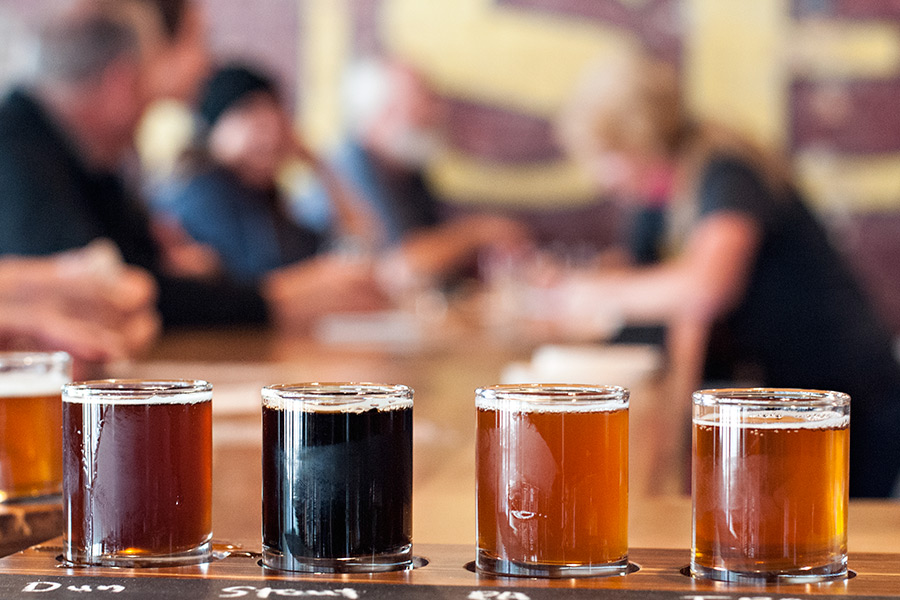Despite an outpouring of support from Montana craft beer brewers, including those hailing from the Flathead Valley’s burgeoning roster of small local watering holes, a proposal to extend their hours of operation past the state-mandated 8 p.m. was tabled in committee last week.
In House Bill 185, Rep. Dave Fern, D-Whitefish, proposed a measure that would have allowed breweries producing between 100 and 60,000 barrels to serve alcohol until 10 p.m., pushing back the current 8 p.m. closing time for taprooms in an effort to grow small business and permit patrons to imbibe later into the evening.
Amanda Dinstel, of Bias Brewing in downtown Kalispell, which opened last summer, said if the brewery was allowed to remain open an additional two hours it would brew more beer, add a larger staff to make and serve it and cater to a clientele thirsty for a product that has enjoyed a steady increase in demand.
“To make that beer, I will be reinvesting in factory equipment and I will be hiring another brewer, immediately,” she said.
Members of the Montana Brewers Association said the change would have buoyed breweries’ bottom lines while helping the state’s overall economy, pointing to the state’s surging craft-beer industry, which continues to employ more people, increase payroll and make a greater number of purchases year over year.
Montana’s craft brewing industry has more than doubled its workforce over the past seven years, and the number of people working for craft breweries went from 231 in 2010 to 1,044 in 2015, according to senior research economist Kyle Morrill, who authored a 2017 study published by the University of Montana’s Bureau of Business and Economic Research.
The study was commissioned by the Montana Brewers Association (MBA).
The debut of these small, local craft breweries and their subsequent success is mirrored across the state and nationally, according to the study, which showed that craft beer production climbed again in 2015 in the Treasure State, rising to 15 percent above where it stood in 2014 and 87 percent greater than its 2010 standings.
Furthermore, the share of expenditures to Montana businesses continues to increase, with a total of $19.8 million paid directly to Montana businesses. The study was the first to estimate agricultural purchases totaling $4.5 million in 2015, 36 percent of which were from Montana agricultural producers.
In 2017, craft breweries produced 12.3 percent of the beer Americans bought, up from just 2.8 percent in 2004, according to the Brewers Association, a national trade group. Meanwhile, overall U.S. beer volume sales were static
The report found that economic benefits include more than $33 million in income to Montana households; sales from businesses and organizations are $103 million higher; and tax and non-tax revenues, not including property taxes, were more than $4 million higher.
The study also found that the industry’s overall economic impact grew by about 20 percent over 2011 numbers, reaching roughly $60 million in 2013.
And with brewing falling under the major industry heading of manufacturing, Montana’s manufacturing sector has enjoyed the largest output gain of $41.6 million due to craft brewing operations, according to the report.
Increasing tap room hours is the natural next step in building momentum in the growing industry, Matt Leow of the Montana Brewers Association said.
“The tap room is the cornerstone of any craft brewery,” Leow said. “It’s how a brewer markets their beer and tests new recipes. It’s how a brewer builds their brand to the point that a bar or restaurant will put their beer on tap.”
But opponents include the Montana Tavern Association, which fears the change will hurt other businesses. The tavern association also says the change would give breweries special treatment, allowing them to circumvent the expensive onus of obtaining an expensive beer and wine license.
John Iverson with Montana Tavern Association, who was one of the 10 opponents to the bill, characterized breweries as manufacturers and not retailers, and said that giving them more hours deprives bars of business.
“The breweries that want to retail more beer want to have their cake and eat ours too,” he said.
The House Business and Labor Committee on Feb. 5 tabled the proposal 16-3 without discussion.
